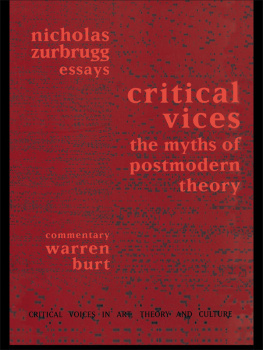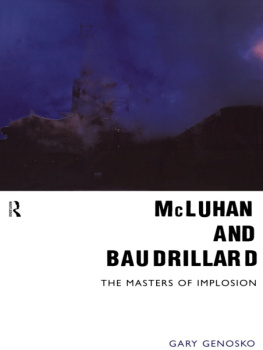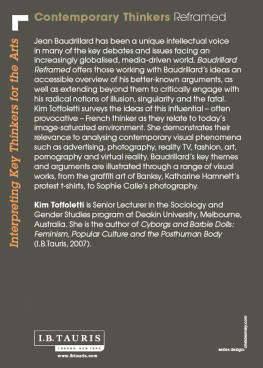
Baudrillards bestiary
The symbolic is neither a concept, nor an instance or a category, nor a structure, but an act of exchange and a social relation which points to an end to the real, which resolves the real, and in the same stroke the opposition between the real and the imaginary.
Jean Baudrillard
This book provides an introduction to Baudrillards cultural theory: the conception of modernity and the complex process of simulation. It examines his literary essays: his confrontation with Calvino, Styron, Ballard, and Borges. It offers a coherent account of Baudrillards theory of cultural ambience, and the culture of consumer society. It also provides an introduction to Baudrillards fiction-theory, and the analysis of transpolitical figures.
The book also includes an interesting and provocative comparison of Baudrillards powerful essay against the modernist Pompidou Centre in Paris and Fredric Jamesons analysis of the Bonaventure Hotel in Los Angeles. An interpretation of this encounter leads to the presentation of a very different Baudrillard from that which figures in contemporary debates on postmodernism.
Informative and consistently challenging, this book will be of interest to students of Sociology and Cultural Studies.
Mike Gane is Senior Lecturer in Social Sciences at Loughborough University.
Baudrillards bestiary
Baudrillard and culture
Mike Gane
First published 1991
by Routledge
11 New Fetter Lane, London EC4P 4EE
This edition published in the Taylor & Francis e-Library, 2003.
Simultaneously published in the USA and Canada
by Routledge
a division of Routledge, Chapman and Hall, Inc.
29 West 35th Street, New York, NY 10001
1991 Mike Gane
All rights reserved. No part of this book may be reprinted or reproduced or utilized in any form or by any electronic, mechanical, or other means, now known or hereafter invented, including photocopying and recording, or in any information storage or retrieval system, without permission in writing from the publishers.
British Library Cataloguing in Publication Data
Gane, Michael, 1943
Baudrillards bestiary: Baudrillard and culture.
1. French Philosophy. Baudrillard, Jean
I. Title
194
Library of Congress Cataloging in Publication Data
Also available
ISBN 0-203-41362-8 Master e-book ISBN
ISBN 0-203-72186-1 (Adobe eReader Format)
ISBN 0-415-06306-X (Print Edition)
0-415-06307-8 (pbk)
I once met someone on a busy train in France, sitting opposite, reading a book by Baudrillard, the same book I was reading myself.
This book is dedicated to the memory of the shared enthusiasm of our discussion
and to all lost friends.
Is it necessary to refer to Holderlins verses on salvation rising on the horizon of maximum peril?
Tafuri
fateful moments exist only in bad novels, and past and future it knows only in curious variations
Benjamin
Acknowledgements
I would like to thank all the many people with whom I have discussed and argued issues raised in this book, but especially Chris Rojek of Routledge who initially persuaded me of the importance of the project and who offered encouragement throughout; also friends and colleagues at Loughborough University, in the Departments of both Social Sciences and European Studies, who have provided expert opinion and critical commentary. I have also given a paper on Baudrillard to seminars at Essex University and Edinburgh University, and to the Discourse and Rhetoric Group at Loughborough University and would like to thank these seminars for their debates. I have also discussed these issues with colleagues on the editorial board of the journal Economy and Society, especially Beverley Brown and Ali Rattansi. I would like to thank Monique Arnaud not only for help with French translations, but also with essential critical discussion on all aspects of this project. Finally, I would like to thank Jean Baudrillard for generously responding to my queries. As is customary and essential, it is necessary to stress that responsibility for any error of fact or interpretation is entirely mine.
Chapter 1
Introduction
The double infidelity
He musttake upon himself the weight of the double infidelity
Blanchot
Baudrillards work represents an attempt to establish a general theory of two fundamental social forms. In one sense it is an evident attempt to rewrite Durkheims two basic social formations (segmental, organized). But Baudrillards relation to Durkheim is certainly not direct, and, if Baudrillard is fundamentally Durkheimian, this is apparent only in displacement, repositioning, total revision. In a sense, however, to regard Baudrillard from this point of view is extremely enlightening. It could be said that what Baudrillard wants to do is to convert the main focus of analysis away from types of social solidarity to two basically opposed forms of culture. There are immediate difficulties in posing the problem in these terms however, and even Baudrillard struggles to maintain a consistent vocabulary. For, at his most consistent, primitive societies do not have cultures. Their societies are lived in the symbolic, and in symbolic exchange. Theirs is a society of us and outsiders (others, gods, animals). Ours is a universal society of the human: it is the latter universe which strictly speaking is culture, and its other is the inhuman (1976:193). Baudrillard develops this distinction through increasingly radical forms.
It is not easy to describe or identify precisely Baudrillards point of departure or fundamental position in this project. It is facile to suggest that he simply supports the position of the primitive against culture. It is only slightly more sophisticated to argue that he is best interpreted as a Nietzschean surveying the disenchanted world with aristocratic disdain. Although it is probably still grossly inadequate as a description, it seems that his position is very close to that of a modern Hlderlin of whom Blanchot has written:
Today the poet no longer has to stand between gods and men as their intermediary. Rather he has to stand between the double infidelity; he must keep to the intersection of this doublethis divine and human reversal. This double and reciprocal movement opens a hiatus, a void which must henceforth constitute the essential relation of the two worlds. The poet, then, must resist the pull of the gods who disappear and draw him toward them in their disappearance. He must resist pure and simple subsistence on the earth which poets do not found. He must accomplish the double reversal, take upon himself the weight of the double infidelity and thus keep the two spheres distinct, by living the separation purely, by being the pure life of the separation. For this empty and pure space which distinguishes between the spheres is the sacred, the intimacy of the breach which is the sacred.








